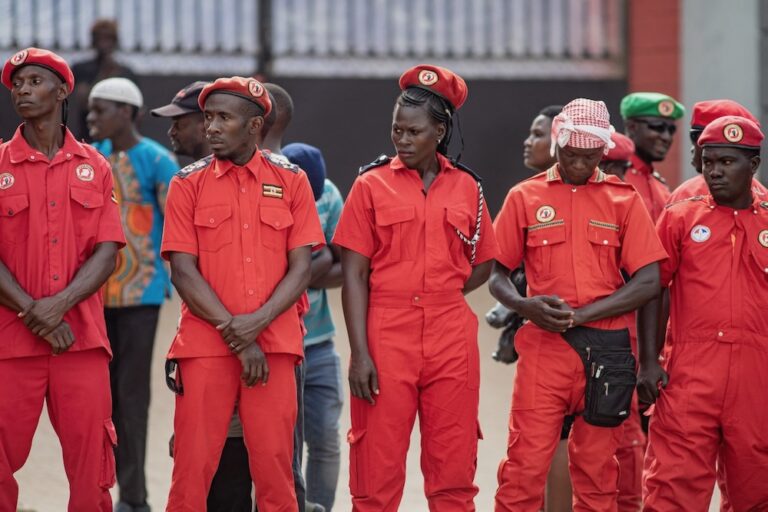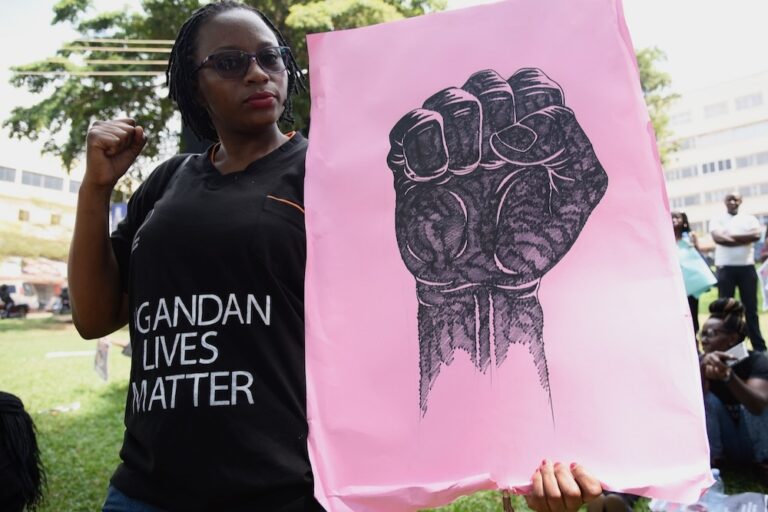Emmanuel Opio was assaulted by the Deputy Regional Police Commander while covering a story regarding the interrogation of four suspects by the police during a demonstration protesting lack of electricity in their region.
(HRNJ-Uganda/IFEX) – 6 January 2012 – The Human Rights Network for Journalists-Uganda (HRNJ-Uganda) is dismayed by the conduct of the Deputy Regional Police Commander (D/RPC) for the Lango region in Northern Uganda, Alfred Tumure, who roughed up a journalist and slapped him before deleting all materials from his photo camera.
Emmanuel Opio, the Daily Monitor correspondent based in Lira district, fell victim to this gruesome act on 17 December 2011 when he was covering a story regarding the interrogation of four suspects by the police during a demonstration protesting Umeme’s [an energy distribution network company] failure to provide power to the area.
The four suspects that underwent interrogation were Mike Adoko, the ruling party NRM spokesperson for Lira district; Patrick Omara, the opposition FDC spokesperson for Oyam district; opposition UPC’s Issa Otto, who is the former area Member of Parliament (MP) for Oyam; and Charles Amiru, who is also a former MP for Erute North in Lira district, all of whom have since been charged with staging an illegal assembly.
Opio says that as soon as he had entered the interrogation room at Lira police, Tumure grabbed his camera and held it for two hours.
Opio told HRNJ-Uganda that “[w]ith the assistance of two other police men, Tumure roughed me up and slapped me before taking away my camera. I had not taken any photos there. He detained me for two hours. He returned my camera only after the intervention of the UPDF army’s 4th division spokesperson, Ceaser Olweny. At the time, the camera had been formatted, thereby deleting all my materials.”
However, Tumure did not inform Opio about the deletion of his material from the camera.
Efforts by Opio to open up a case file against Tumure at the Lira Central Police Station were frustrated when all the police officers including the OC CID Tugume Godwin, Owuni (Police no: 26351) and Mapuwe (no: 25129), along with other plain clothed policemen, turned him away.
“They said they could not institute a case against their very superior. Tugume told me that he had consulted with the Resident State Attorney who sealed the matter when he advised that there was no case to be brought against Tumure since he had committed no crime,” said Opio.
Tumure, who declined to comment about the deletion of the materials from Opio’s camera, told HRNJ-Uganda that he was not aware that Opio had any concerns. “I am not aware that the journalist was aggrieved at all.”
The Lira CPS officer in charge of Training and Administration, Fisto Sikaku, told HRNJ-Uganda that Opio was free to report his case to any other nearby police station or to the Police’s Professional Standards Unit (PSU) in Kampala.
He said he did not know on which grounds they denied Opio his right to file a case. Opio feels aggrieved because he was assaulted, intimidated and harassed.
“It is very unfortunate that the police – who are supposed to uphold law and order – blatantly abuse people’s fundamental rights including the freedom of the press and the right of access to information, which serve as the eyes and ears of the public. Otherwise, this is a serious case of abuse of office, which HRNJ-Uganda has resolved to pursue to the very end,” warned the HRNJ-Uganda Program Coordinator, Geoffrey Wokulira Ssebaggala.
He added that it seems that there was collusion among the officers to frustrate the journalist’s efforts in seeking justice from a law enforcement institution.
HRNJ-Uganda calls on the police in the area to allow the journalist to open up a case against the deputy RPC Tumure within the week.
HRNJ-Uganda therefore calls upon the police force to use internal mechanisms to prevail over its errant officers like Tumure and Tugume.


